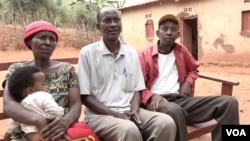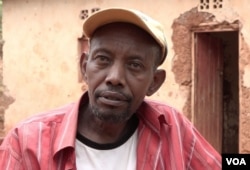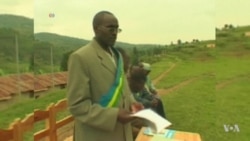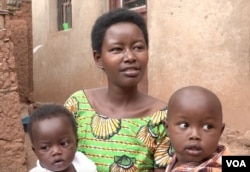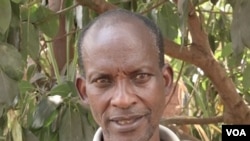*This report originated in VOA's Africa Division.
BUGULI, RWANDA — Valens Rukiriza’s mud-walled house was too dim for a journalist’s on-camera interview. So, he and neighbor Silas Bihizi lugged a long wooden bench out of the tidy living area and into the dusty courtyard, one man on each end, negotiating turns with easy familiarity.
They already have grappled with a much weightier task: reconciliation.
Twenty-four years ago, Bihizi joined other ethnic Hutus in killing five Tutsi neighbors: Rukiriza’s brother, the man’s wife and their three children. It was part of the three-month spasm of bloodshed triggered on April 6, 1994, when the plane carrying President Juvenal Habyarimana was shot down over the capital, Kigali. The president was a Hutu. Extremist Hutu militants rampaged, attacking the minority Tutsis and Twas as well as Hutu sympathizers. At least 800,000 people died, most of them Tutsis; the Rwandan government puts the genocide’s toll at more than 1 million.
"I was among those who participated in the killings," the soft-spoken Bihizi acknowledged.
"We were friends and neighbors," he also said of Rukiriza and his kin. "We shared a lot and visited each other’s families."
Years in prison
Bihizi was arrested in early 1995 for actions he had come to abhor. He was among at least 130,000 suspects rounded up after the violence. With the justice system overwhelmed, most were imprisoned without trials.
Bihizi spent 13 years in overcrowded Gitarama Central Prison, now called Muhanga Prison, in Southern Province. He was released to face a gacaca – the Rwandan government's form of community-based courts, involving victims' relatives and friends, set up to speed prosecutions stemming from the genocide.
The gacaca for Bihizi took place here in Buguli, a community of roughly 500 people – mostly subsistence farmers growing corn, bananas, cassava and sweet potatoes – tucked amid hills.
"During the trial, I confessed, asked for forgiveness and was sentenced to 13 years" – the time served, Bihizi explained.
WATCH: 2 Rwandan Families Reconcile After Genocide
Rukiriza, the key witness against Bihizi, told VOA that he had argued for a life sentence.
"We had to accept his apology, but it was difficult. It required one being brave. At first I hesitated. I felt I could not do it. But, thanks to God, I had to accept the apology," said Rukiriza, a Christian. "Our government encourages us to promote unity and reconciliation and to co-exist peacefully. It's God who made this happen. If you don't like unity, you're actually hurting yourself. You will be restless, full of stress, because of that heavy burden that you carry."
After his release, Bihizi returned to his wife, their seven children and his farm work – but worried about the inevitable meetings with his victims' relatives.
"I prayed for strength to confront them and ask for their forgiveness" again, Bihizi told VOA. "I decided confessing was not enough and went ahead to meet them. I apologized and sought forgiveness because I wanted to free my soul."
An unexpected union
Repairing the broken relationships has been an ongoing process.
A big step came in 2009, two years after Bihizi's release. His son, Stanislas Niyomungeri, approached him with plans to wed Hyacinthe Murayire – Rukiriza’s daughter.
"That came as a shock to me. I couldn’t imagine having to face Rukiriza again to tell him that my son wanted to marry their daughter," said Bihizi.
Her father resisted, too. Rukiriza didn't think it was right that his daughter would wed the son of a man who had ripped apart the family.
But the young couple were deeply in love. Stanislas Niyomungeri swore he would commit suicide if they could not be together.
"He repeated those threats to my family when we visited them," Murayire recalled. "It is then that I made a decision: Instead of losing him, I'd rather stay away from my family if they opposed our marriage."
Given the prospect of losing his daughter, Rukiriza relented and blessed the marriage. He called it "supporting reconciliation."
"I did it to avoid self-torture and living a stressful life," he said.
Forgive but don't forget
That measure reflects the Rwandan government’s approach to recovering from the genocide. It has stripped ethnic categories from national identity cards and textbooks, denounced "divisionism" and urged Rwandans to forgive but not forget.
Today, both Rukiriza’s and Bihizi’s bloodlines commingle in three young, beloved grandchildren.
"They love me. I enjoy seeing them running to hug me every time I visit them. They are very warm," Bihizi said. "When I see them, I reflect back and regret that other kids like them had their lives cut short.
"What happened was terrible – and kids should not have to go through that again."




